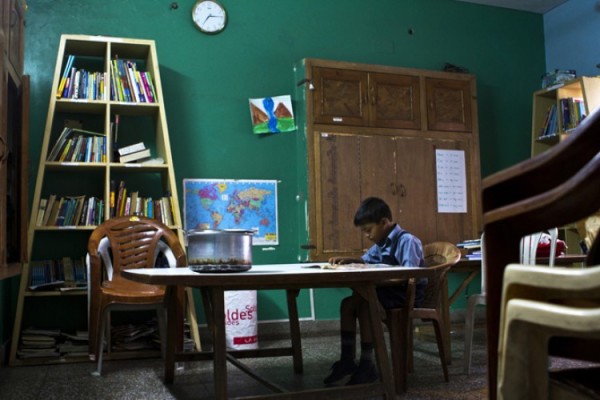After two decades of wondering what to write on forms in the `What is your mother tongue’ column, I finally stopped apologising to myself and the world for not knowing any of my native languages and declared openly in the answer space – ‘English.’ But it is only five years ago, when I helped my closest friend Pascal set up our NGO for street children in Delhi, called Tara; that the real value of the language became clear to me. We were setting up a shelter for children from under-privileged homes. These are children who had often been to a municipal school or their village and came to us ostensibly having studied in these schools upto class 6 or 7. But they couldn’t do basic math or science and English was non-existent. We had to make a decision. We were setting ourselves up in Delhi. Most of the kids that came to us spoke Hindi. Should we not send them to Hindi medium schools? And inculcate a general culture of Hindi about the place? We decided instead to be a place that was about English. At the time our reasons, though sound and nuanced weren’t so well articulated. But looking back, much of it had to do with class. How English in a city like Delhi is perhaps the biggest possible divide. Those who speak it well are all, without a doubt, the haves. Those who don’t, definitely closer to or part of the have nots. In an ideal world, education should be taught in a child’s native tongue. We were all hyper aware of this. And of all the academic research done to show how educating children in a foreign language or a language alien to them can prevent them from learning.
But we also knew what the road ahead would be if we only schooled them in Hindi. Their access to the information super highway, to jobs and exposure to the world would be cut short without English. Our goal also matched with the parents and guardians of the children – many of whom are homeless and single women that have been trafficked. The parents wanted their kids to turn into ‘English-speaking gentlemen.’ The word ‘gentleman’ is extremely potent. It includes within a world where people automatically have dignity and respect and proper office jobs. A car and a house and a regular family. None of us was making out the case that in the absence of English these things cannot be had. We were in fact not happy to have to teach the children to aim for an education in a language that would have to be taught to them from scratch. But with so many disadvantages, broken homes and no real culture of education behind them, we wanted them to have the easiest, most potent tool to jump into the Indian middle class. English.
And now, four and a half years later; I present to you – 12 year old Kishan. When he came to us, besides smiling beautifully, not a word of what was said in our in-house English class was understood by him. It was about a year later that the code cracked open and Kishan stepped into a new world. In this new world he discovered first, in English that he wanted to grow up to be a bird. A year later, he had discovered Harry Potter – but this was mostly on Sundays and in the Hindi version of the film series. Still, he flew around Tara on his broomstick declaring to all those who asked, in English that he now wanted to grow up to be Harry Potter. Now, at the ripe young age of twelve, the world has shattered that illusion but not completely. ‘”I want to be a scientist who can invent a way for me to fly,” he now says. Kishan made it through two stages of auditioning for a BBC film – a fact he is extremely proud of. When he visits his home, his parents say he is the star of the colony. Mainly because of his English. He is now learning other languages in his school – Chinese and French. `Ne hao’ is how he greeted me when I met him a fortnight ago.
With another of our kids, the story has more layers. He doesn’t want to be named, but his story is worth recounting. He goes to an English medium school where his best friend comes from a very different background. One day, our young man wanted to invite his new best friend over to Tara. The friend’s mother said that was perfectly fine as long as an adult was accompanying them from the school bus stop back to the shelter. The boy, used to walking back from the bus stop on his own was not able to get an adult to volunteer to come fetch his friend that day. His friend told him – `We can lie and tell my mum there is an adult waiting to get us. She will believe you because she trusts you even more than she trusts me.’ That is when the penny dropped. Trust and respect were precious indeed. So our Tara boy hid in the lawn behind the bus stop for a long time, crying to himself as he wondered what to do. To lie and get his friend to visit the shelter minus a chaperone or to come clean to the friend’s mother. He decided to come clean. This is a boy for whom class is a very, very sensitive issue. English is only a small part of that. Respect and holding onto your belief is the bigger part.
In fact at Tara, the rules around English go along with a culture that does not revere either class or the structures that English speaking people have made up around themselves. English is a tool but can be used to be irreverent and claim your space and talk back and subvert the system. “You cannot punish us by taking away our right to watch tv,”said an indignant Jaan – now 18 and the most proficient in English. “By doing that, you are denying us the exposure we need that tv provides,”he protested to the Tara staff.
The fact that a French speaking man – Pascal is at the helm of affairs, whose on many an occasion struggles with English himself, takes away much of the reverence associated with the language. It’s essential but not to be worshipped is one way the Tara culture around English could be summed up.
English also allows the kids at Tara to facebook and skype and email their sponsors, many of whom are in France. A large family of expat volunteers that tutor the kids in English and maths and music in the afternoons stay in touch long after they’ve returned to their home countries. The only language the expats from Spain, Mexico, France, Australia, England and America have with Tara is English. It’s put the world on the map for the kids like no geography class can. Victor who came from Mexico put his footprint on their lives by taking them through weekend classes in Mexican food since he was a chef. It began with the kids drooling over chocolate in the film Willy Wonka and the Chocolate Factory after which they all wanted to learn to make chocolate. Enter: Victor who began by teaching them to make a Mexican version of chocolate with ingredients readily available in the Tara kitchen – a sugar reduction of thick treacle. The kids christened him `Willy Wonka’ and that name stuck. But the only way Victor’s world could collide with Tara’s was via English.
For the older kids – like Sidhu who is also now 18 and in class twelve, it is much harder to grasp how speaking in English does not immediately or automatically guarantee a place in the Indian middle class. The divide is still very sharp and needs much more work than mastery over English. At a summer internship at a rafting camp the divide showed up sharply and it hurt. Outside the protective space of the shelter, knowing some English can make life much more painful. You have now moved too far from where you once were and are still very far away from the horizon you are walking toward.
It’s too early to say if in pushing English we at Tara did the right thing. So far, the fact that the kids are confident enough now to go up to the French ambassador at a benefit dinner with questions in English like – `Isn’t it boring for you to spend the whole day just being polite to people for a living?’ makes us feel we are on the right track. There are other encouraging nuggets. A volunteer who was returning after a long gap introduced his new wife to the kids and was asked by one in return – `Excuse me for asking a personal question sir, but what did you do with your old wife?’ The volunteer smiled, knowing the kids were smart enough to get what came next – `Oh she was getting old, so I returned her to the shop and got a new one.’
Some of what makes the Tara kids bold and fearless has a lot less to do with English alone. 16 year old Sunil couldn’t speak much Hindi or English when he first arrived, from a village in Chhattisgarh. He wrote essays to himself in Hindi every night in a desperate attempt to fit in. His first class barrier then was Hindi. Soon, he moved into a space where he started pushing himself to learn English. Last year, he stood for elections to be the next child representative at Tara’s weekly staff meetings. He won the election after putting up posters in English that read – ‘If you vote for me, I will get you a girlfriend.’ For Sunil it’s been a very long journey from the days in his village where he was made to hunt bears. But Hindi and English isn’t what made the biggest difference. What did was far more beautiful and precious and is what he articulated to me on a ride home from the doctor two years ago, in Hindi. ‘When I first came to Delhi, I didn’t know what computers were or what flyovers or the metro was. But most important of all, is what I didn’t know and learned at Tara and that is respect. I finally understood what respect means.’ For us English should not be the one thing that either gives or takes away respect from people. However, if it can make the world of respect and aspirations more easily accessible, then that is the way we will go. For now.






Leave a reply